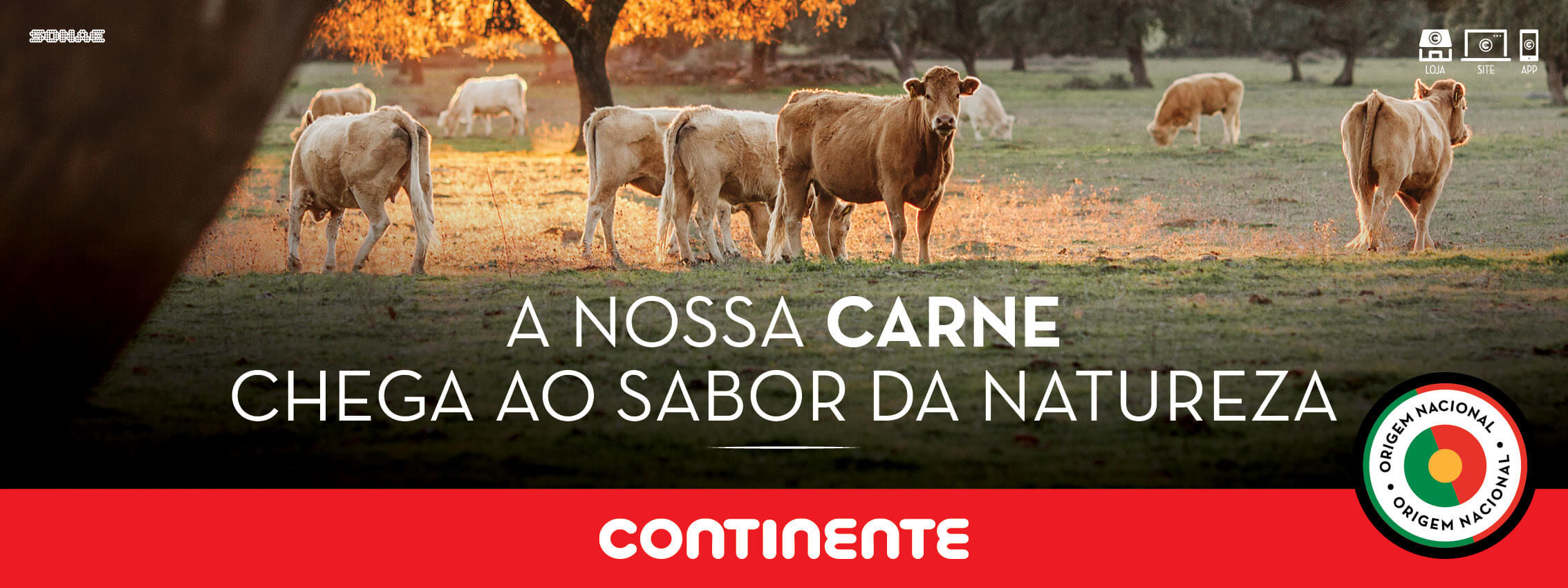Continente Beef with International Animal Welfare Certification
Meat from the Aberdeen-Angus Continente® and Limousine Continente® brands, for sale exclusively at Continente stores, received international certification in Animal Welfare throughout the entire production chain, in accordance with the “Welfare Quality” International Protocols.
This certification in Animal Welfare, controlled and certified by an independent external entity, is based on 12 criteria on which main parameters such as feed, accommodation, health and freedom to express the animals' natural behaviours are evaluated.

Sonae MC's concern is to guarantee the promotion of sustainable practices that guarantee the quality of a food system as well as respect for the environment throughout the entire process – from the meadow to the plate.
Society and consumers are increasingly aware of the importance, and the way, in which food is produced in general. “This certification allows us to recognize and guarantee greater safety for the consumer and greater traceability starting from production all the way to the moment of consumption”, says Ricardo Creado, Sonae MC’s Commercial Director. “Animal welfare improves animal health and food quality, reduces the need for medicines and helps preserve biodiversity, so our goal is, and always will be, to ensure the best product quality for our customers. That is something that is increasingly seen when meat comes from producers who care and comply with Animal Welfare on their production”, explains the responsible.
This Continente’s certification includes around 100 national producers, 3 slaughterhouses, 3 cutting rooms and its central meat processing unit. All points were audited to verify compliance with the Welfare Quality’s Protocol measures - A Protocol that later gave rise to the WelfairTM seal, certified by CERTIS, a national certifying entity accredited by the IRTA (international entity responsible for the control and attribution of the seal at the Iberian level).
In 2020, Continente transversally increased its purchases of domestic meat to 57,000 tonnes, with the highlight being in the beef category, where it doubled purchases from domestic production, heavily leveraged in the Angus and Limousine breeds and also in the indigenous breeds.
This certification in Animal Welfare, controlled and certified by an independent external entity, is based on 12 criteria on which main parameters such as feed, accommodation, health and freedom to express the animals' natural behaviours are evaluated.

Sonae MC's concern is to guarantee the promotion of sustainable practices that guarantee the quality of a food system as well as respect for the environment throughout the entire process – from the meadow to the plate.
Society and consumers are increasingly aware of the importance, and the way, in which food is produced in general. “This certification allows us to recognize and guarantee greater safety for the consumer and greater traceability starting from production all the way to the moment of consumption”, says Ricardo Creado, Sonae MC’s Commercial Director. “Animal welfare improves animal health and food quality, reduces the need for medicines and helps preserve biodiversity, so our goal is, and always will be, to ensure the best product quality for our customers. That is something that is increasingly seen when meat comes from producers who care and comply with Animal Welfare on their production”, explains the responsible.
This Continente’s certification includes around 100 national producers, 3 slaughterhouses, 3 cutting rooms and its central meat processing unit. All points were audited to verify compliance with the Welfare Quality’s Protocol measures - A Protocol that later gave rise to the WelfairTM seal, certified by CERTIS, a national certifying entity accredited by the IRTA (international entity responsible for the control and attribution of the seal at the Iberian level).
In 2020, Continente transversally increased its purchases of domestic meat to 57,000 tonnes, with the highlight being in the beef category, where it doubled purchases from domestic production, heavily leveraged in the Angus and Limousine breeds and also in the indigenous breeds.
